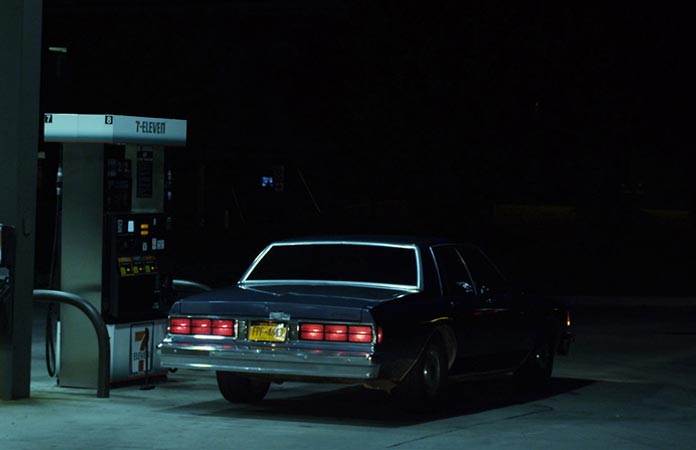DVD Review: Blue Caprice
Published on January 31st, 2014 in: Current Faves, DVD, DVD/Blu-Ray Reviews, Movie Reviews, Movies, Reviews |Reviewing a narrative film based so closely on real-life tragedy is a challenge. If it were a documentary, it might be easier to analyze how the filmmaker’s possible agenda influences the way the events were presented and if the recounting of history was done responsibly.
Blue Caprice opens with what seems like a documentary cliché: a montage of news footage covering the Beltway Sniper attacks from 2002. Immediately, we feel a distance from the subject being addressed. Then, the film cuts to a series of scenes of a teenage boy in Antigua, trying to cope with his mother’s departure to find work in the United States. The visual dichotomy between grainy newsreels and the lushness of the Caribbean is as profound as the tonal one. There is no reporter documenting what we’re seeing so we’re forced to make sense of what’s going on.
A lot of films are described as “slow burn,” usually those of the thriller variety, when they don’t immediately overwhelm the audience with a lot of visual or auditory action, but Blue Caprice is a slower burn than most. It even feels like nothing is actually happening, or at least nothing that indicates that we should be invested in what’s taking place. In a 90-minute film, this could come across as a misstep, but after watching the events unfold it feels necessary.
Director Alexandre Moors and screenwriter R.F.I. Porto stayed eerily true to many of the facts about the Beltway Sniper attacks. In the film, John represents John Allen Muhammed, the American who found a willing pupil in Jamaican teenager Lee Boyd Malvo, here known only as Lee. Similarly, John is angry with his ex-wife for taking custody of his kids and denying him visitation, a scenario that reflects Muhammed’s real life situation. Moors and Porto wisely avoid any mention of Muslim extremism or jihad; no doubt that addressing Muhammed and Malvo’s twisted fundamentalism would not only add fuel to the fire of ignorant, Islamaphobic conservatives but also possibly misinterpret their warped worldview and offend the devout.
Blue Caprice is a small movie about big events. This isn’t meant as criticism, but praise. It’s difficult to breathe life into people who were portrayed in the news as monsters; it’s an even bigger challenge to humanize them without sympathizing with them too closely. It’s both a blessing and a curse that we compartmentalize the horror of the frequency of mass murders. On one hand, we can’t let our sanity slip away in the face of tragedy but on the other, we run the risk of becoming immune to the human cost.
Elijah Washington is terrifying as John although he rarely raises his voice. It’s disturbing how his seemingly righteous anger starts to fester and then infect every other aspect of his life. As Lee, Tequan Richmond is a pathetic figure; the shift from abandoned child to cold-blooded killer is obvious in his eyes, even as he struggles to accept it. Both are faced with all-too-common, though still distressing crises, which makes their surrender to homicidal impulses that much more frightening. There’s no lofty idealism here; just two people who got fucked over by those they loved and direct their anger outwards, transforming their personal problems into impersonal murders.
The score, by Colin Stetson and Sarah Neufeld, combined with the monotony of long takes of the titular car driving slowly down highways across the US, is bloodcurdlingly creepy, as are the superimposed targets over the faces of people who have no idea what kind of danger they’re in. Rarely does a non-horror movie unsettle me so much.
By avoiding judgment, focusing so precisely on the little dominoes that inevitably fall, and presenting the events unglamorously without any shred of witty dialogue, Blue Caprice brings the terror to you and forces you to confront it. It’s an ugly sight but a beautiful piece of cinema.
Blue Caprice was released on DVD on January 14 through IFC Films. The DVD contains a commentary track by Alexandre Moors and R.F.I. Porto as well as a press conference from the Deauville Film Festival, a Behind the Scenes featurette, and the theatrical trailer.

Time limit is exhausted. Please reload the CAPTCHA.